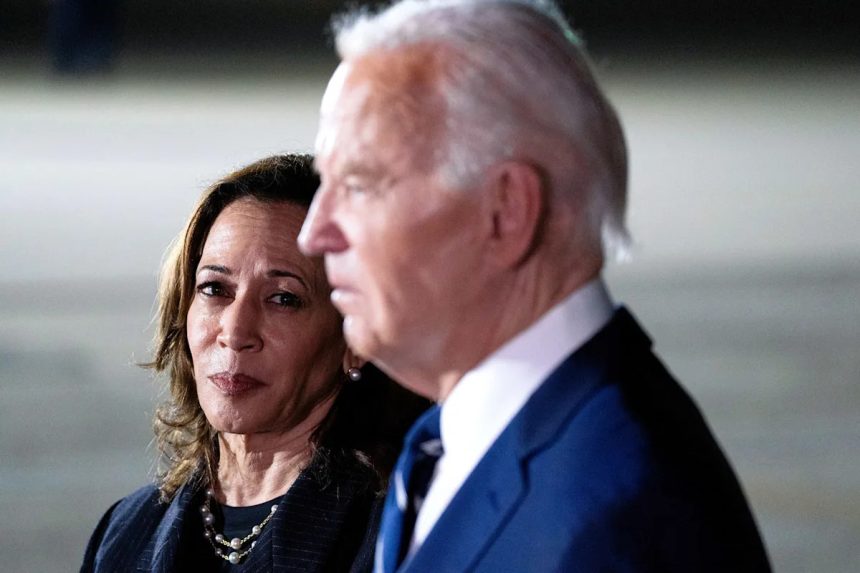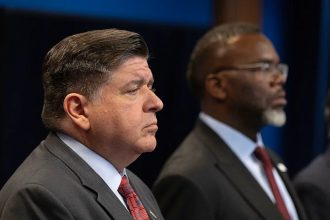For years it was an open secret in Washington that former Vice President Kamala Harris had amassed powerful critics among the advisers closest to President Joe Biden. As a Democratic strategist and columnist during the Biden presidency, I received my fair share of insider pitches from Harris skeptics in the West Wing. This week’s much-hyped preview of Harris’ upcoming memoir, “107 Days,” reveals a politician finally ready to reclaim ownership of her own political and personal narrative.
“I often learned that the president’s staff was adding fuel to negative narratives that sprang up around me,” Harris writes. “One narrative that took a stubborn hold was that I had a ‘chaotic’ office and unusually high staff turnover during my first year.”
The gossip wasn’t subtle. Within months of Biden’s inauguration, Beltway gossip columns openly discussed the tension between Harris and first lady Jill Biden. White House staffers did little to rebut (and often quietly supported) stories of Harris’ staff dysfunction that later made their way into prominent political tell-all books. I even wrote about Biden’s bizarre decision to sideline Harris despite her significant achievements in a 2023 column for this website.
Harris, according to her book, took Team Biden’s barbs in stride because she understood how critical it was for Democrats to telegraph unity and shared purpose after four divisive years of Donald Trump. She might have hoped that her willingness to overlook all that political backbiting would be repaid with respect and support from Biden’s team after taking over Biden’s spot on the Democratic ticket in August 2024. That respect never came.
Instead, Biden loyalists piled blame onto Harris for the party’s 2024 losses just days after the election. They could have — would have — done it better, they recounted to journalist Franklin Foer. Whatever dignity Harris expected to earn from her grace, it’s clear she wildly misunderstood the intensity of political tribalism in Biden’s inner circle. Now, freed from her connection to her former colleague, Harris and her team are finally venting their frustrations.
Democrats should listen closely, because Harris is articulating a key problem that still plagues the party even after Biden’s departure.
Anyone who doubts Harris’ claims need only look at the bitter response from Biden world. On Thursday, anonymous former Biden advisers dismissed Harris as playing “zero substantive role” in the administration, and instead focusing on “stilted photo ops.” That those advisers refused to put their names behind such nasty accusations speaks volumes about the toxicity that still dominates Biden’s inner circle.
Rhonda Elaine Foxx, former Biden campaign director of women’s engagement, was among the first to validate Harris’ account of her treatment on the campaign trail. In a post on X, Foxx recounted emailing Biden staffers about the dismissive way women of color were treated on the campaign, specifically around the uphill battle to give Harris any visible presence at major Black cultural events — the same Black voters who played a pivotal role in Biden’s 2020 victory, and who Biden personally pledged to represent in his inaugural remarks.
“The fight just to have a campaign presence at the Zeta convention referenced in her excerpt was insane,” Foxx wrote. “Black spaces that should’ve been obvious priorities for coalition-building were dismissed. The expertise of Black staffers was constantly dismissed. What the VP says in 107 Days is right: our biggest challenge isn’t just Trump, it’s us.”
Lest anyone think Foxx is just a disgruntled former staffer, her post received public support in a post from former Democratic National Committee Chair Jaime Harrison, one of Biden’s most visible backers during the campaign.
Harris’ book and the testimonials of former staffers paint a picture of a vice president willing to suffer petty humiliations in order to maximize Democrats’ chances of beating Trump in 2024. Instead of embracing Harris’ proposals to increase the campaign’s engagement with Black communities, the Biden team egotistically dismissed them as efforts to promote her own brand over and above the boss.
“Their thinking was zero-sum: If she’s shining, he’s dimmed. None of them grasped that if I did well, he did well,” Harris wrote. “It would serve as a testament to his judgment in choosing me and reassurance that if something happened, the country was in good hands. My success was important for him. His team didn’t get it.”
The Biden team’s growing insecurity about Harris’ publicity would have disastrous consequences on Election Day, when Black voters bolted from a Democratic Party they felt took them for granted. Democrats won 87% of Black men and 95% of Black women in 2020. Four years later, they won just three-quarters of Black men and 89% of Black women.
Harris’ memoir is a cautionary tale about what happens when a president allows his senior staff to amass too much decision-making power. Time and again, Harris describes her personal relationship with Biden in positive terms, yet key campaign decisions seemed to be made by staffers who rarely or never consulted Biden directly. Perhaps had the former president been informed, he would have made different decisions.
Unfortunately for the American people, the extreme control Biden’s team had over his day-to-day decisions means we will likely never know. What is clear is that Harris doesn’t deserve the venom heaped upon her in the wake of Democrats’ 2024 losses, and she’s no longer willing to take incoming fire for a White House team that apparently showed little loyalty or decency to her. As someone who has spent nearly two decades fighting to build a Democratic Party that lives up to its moral promise both internally and externally, I say it’s about time.
This article was originally published on MSNBC.com









